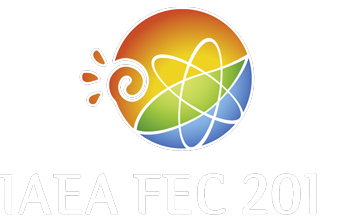Speaker
Dr
Jeff Candy
(General Atomics)
Description
Development of a validated integrated modeling framework is a fundamental research task within the US fusion energy program. A primary component of this framework is an accurate transport model describing the small-scale, gradient-driven plasma microturbulence and its associated cross-field transport. Design and calibration of accurate transport models requires a database of well-converged nonlinear gyrokinetic simulations, which is a very computationally challenging undertaking. As early as 2008, GYRO simulations of ITER operating scenarios were observed to produce levels of nonlinear zonal-flow (ZF) activity large enough to quench turbulence inside the plasma core. This observation implied that modeling estimates of fusion power in ITER may have been pessimistic because turbulent transport was overestimated. The existence of flow-dominated, low-transport states persisted even as more accurate and comprehensive predictions of ITER profiles were made using the TGLF transport model. This was in stark contrast to GYRO-TGLF comparisons for modern-day tokamaks, for which GYRO and TGLF are typically in close agreement and transport is well-above threshold. It was speculated that closeness to threshold, ZF activity, and electromagnetic effects, could all play a key role in this discrepancy. Importantly, it became clear that TGLF must be generalized to include ZF stabilization for more accurate ITER simulations. The ongoing recalibration process also uncovered additional new concerns related to the accuracy of both the GYRO simulations as well as the TGLF saturation rule. Plaguing the workflow for the ZF recalibration effort is the intermittency of the near-threshold GYRO simulations. A second surprising result was that magnetic compression is strongly destabilizing in these plasmas, another effect not reproduced by TGLF. Exhaustive simulation and recalibration efforts are summarized, which represent an enormous undertaking carried out in stages over a period of years.
| Country or International Organization | USA |
|---|---|
| Paper Number | TH/P2-7 |
Author
Dr
Jeff Candy
(General Atomics)
Co-author
Dr
Gary M. Staebler
(General Atomics)

